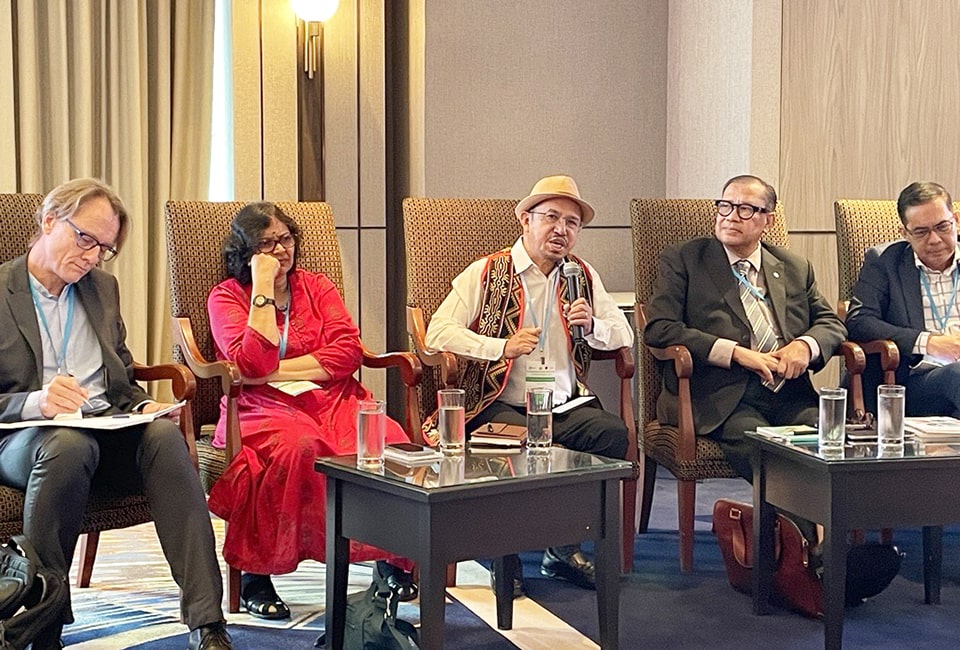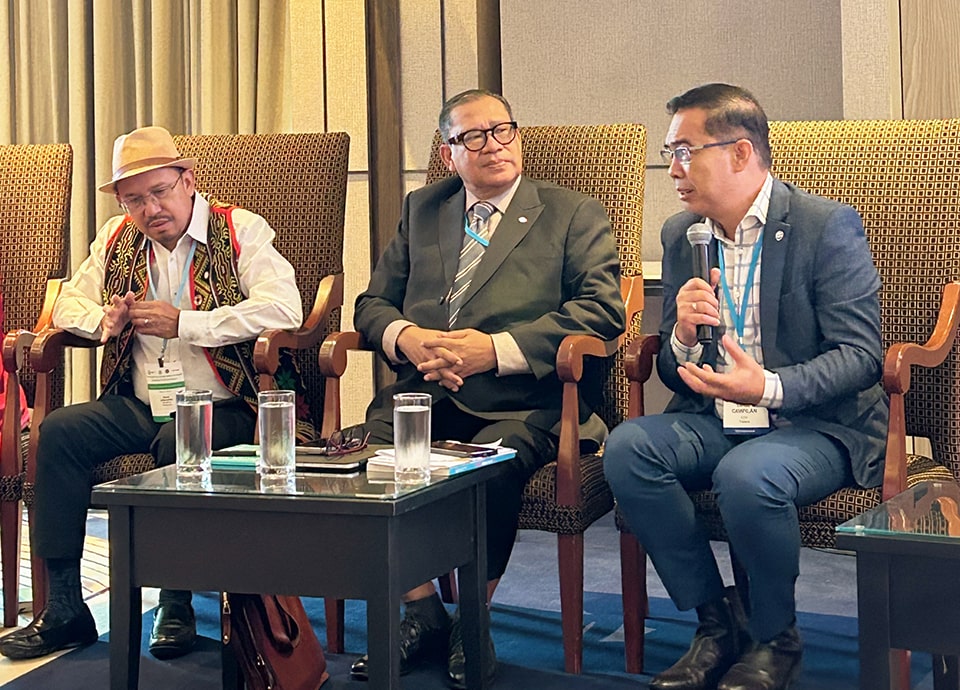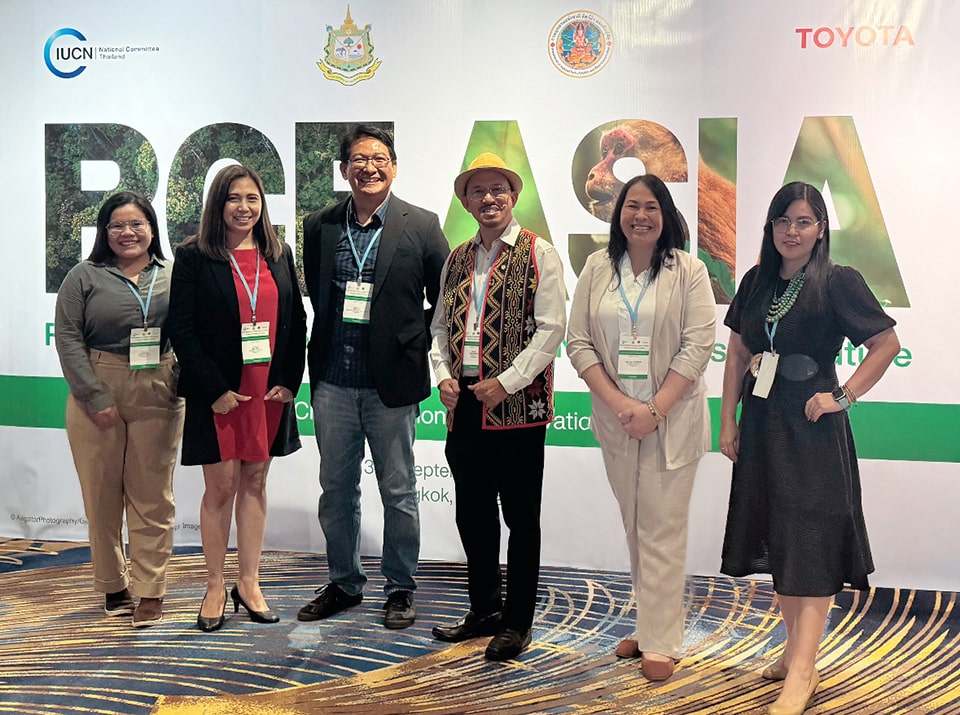 SEARCA Center Director Dr. Glenn Gregorio (center) underscores the need for agricultural innovations that prioritize both profitability and biodiversity conservation.
SEARCA Center Director Dr. Glenn Gregorio (center) underscores the need for agricultural innovations that prioritize both profitability and biodiversity conservation.
BANGKOK, Thailand—The Southeast Asian Regional Center for Graduate Study and Research in Agriculture (SEARCA) made a strong case for sustainable agri-food systems at the 8th International Union for Conservation of Nature (IUCN) Asia Regional Conservation Forum (RCF 2024) held in this city on 3–5 September 2024.
According to IUCN, the event brought together about 600 conservation leaders to assess progress and set strategic directions to effectively address environmental and biodiversity challenges over the next 20 years.
Themed "Reimagining Conservation in Asia: A Nature Positive Future," RCF 2024 laid the groundwork for the upcoming IUCN World Conservation Congress in Abu Dhabi. The forum served as a platform for IUCN members and stakeholders from government, academe, NGOs, international organizations, and the private sector to discuss and agree on Asia's priority conservation agenda and give feedback on IUCN's 20-year Strategic Vision and Programme.
As a panelist in the session on transforming agri-food systems, Dr. Glenn Gregorio, SEARCA Center Director, emphasized the critical balance between agricultural productivity and biodiversity conservation. He noted the increasing pressure on natural ecosystems due to agricultural activities and the challenges posed by climate change. He also underscored that sustainability in agriculture hinges on innovation that benefits both farmers and ecosystems.
"Farmers are primarily concerned about profitability, which is why agricultural innovations must focus on improving productivity while simultaneously supporting biodiversity conservation," said Dr. Gregorio.
He proposed several solutions, including landscape approaches, farm clustering, ridge-to-reef initiatives, circular value chains, and low-carbon farming approaches such as conservation agriculture and climate-smart villages. These, he explained, are essential to achieving a "produce more with less" framework.
Dr. Gregorio further elaborated on the need for carbon-wise agriculture—a system that optimizes production while minimizing emissions at every stage from soil preparation to consumption.
"Carbon-wise agriculture involves minimal emission from the soil, optimal use of fertilizers, proper water management, use of the most suitable varieties, circular economy principles, and renewable energy," Dr. Gregorio explained, emphasizing that these practices are vital to advancing nature-positive food systems.
Dr. Gregorio also outlined ways to promote eco-friendly agricultural practices, including strengthening partnerships with academic institutions, industries, governments, and NGOs. He stressed the importance of investing in carbon-neutral solutions, improving food systems, developing biodiversity-focused policies, and engaging youth in sustainable agricultural innovation.
 Dr. Dindo Campilan (right), IUCN Regional Director for Asia and Hub Director for Oceania, advocates for protected areas and win-win agricultural strategies to support smallholder farmers.
Dr. Dindo Campilan (right), IUCN Regional Director for Asia and Hub Director for Oceania, advocates for protected areas and win-win agricultural strategies to support smallholder farmers.
Dr. Dindo Campilan, IUCN Regional Director for Asia and Hub Director for Oceania, concluded the session by emphasizing the importance of identifying areas for protection and conservation and offering win-win solutions where agriculture can serve as a mutually beneficial strategy for smallholder farmers. He encouraged the participants to champion agriculture as a mainstream focus in IUCN's vision, invited recommendations on the potential roles of IUCN in agricultural systems, and broached partnerships with agricultural experts to develop mutually beneficial solutions and ensure that agriculture is integrated into nature-based solutions.
The SEARCA delegation also included Ms. Sharon Malaiba, Unit Head for Partnerships and Lead of the Young Forces for Agricultural Innovation (#Y4AGRI); Ms. Leah Lyn Domingo, Public Relations Specialist; Ms. Loise Ann Carandang, Senior Associate for Communications and Youth Co-Lead, #Y4AGRI; Ms. Beatrisa Martinez, Executive Coordinator; and Dr. Stephen Redillas, OP, Senior Director of the Planning and Operations Department and Lead of the Sustainability Program, Colegio de San Juan de Letran Calamba, Philippines.
Represented by Ms. Carandang, SEARCA also actively participated in the Youth Leaders Forum, a side event of RCF 2024 attended by young delegates from across Asia, including SEARCA-sponsored youth delegates from Cambodia and Vietnam. The forum emphasized youth engagement in IUCN programs and measurable outcomes. An interactive session on youth-led Asian projects provided insights and inspiration.
Dr. Gregorio, Ms. Malaiba, and Ms. Carandang were also active participants in the Learning Zone on Land Health Monitoring Framework, which presented Vietnam's smart insect monitoring system developed by RYNAN Technologies. The SEARCA team discussed with Dr. Andrew Wyatt of IUCN Vietnam the possibility of introducing AI technology in other Southeast Asian countries. The team also introduced SEARCA to Ms. Vu Thi Bich Hop, the Executive Director of the Centre for Sustainable Rural Development, a non-profit organization in Vietnam that focuses on sustainable agriculture and livelihood. SEARCA and SRD will further discuss possible areas of collaboration through a virtual call.
Dr. Gregorio said SEARCA's participation in RCF 2024 underscored its commitment to advocate sustainable agri-food systems as a critical component of broader regional conservation efforts in Asia.
 The SEARCA delegation to IUCN’s RCF Asia 2024 comprises (from left) Ms. Loise Ann Carandang, Ms. Sharon Malaiba, Dr. Stephen Redillas of Colegio de San Juan de Letran Calamba, Dr. Glenn Gregorio, Ms. Leah Lyn Domingo, and Ms. Beatrisa Martinez.
The SEARCA delegation to IUCN’s RCF Asia 2024 comprises (from left) Ms. Loise Ann Carandang, Ms. Sharon Malaiba, Dr. Stephen Redillas of Colegio de San Juan de Letran Calamba, Dr. Glenn Gregorio, Ms. Leah Lyn Domingo, and Ms. Beatrisa Martinez.